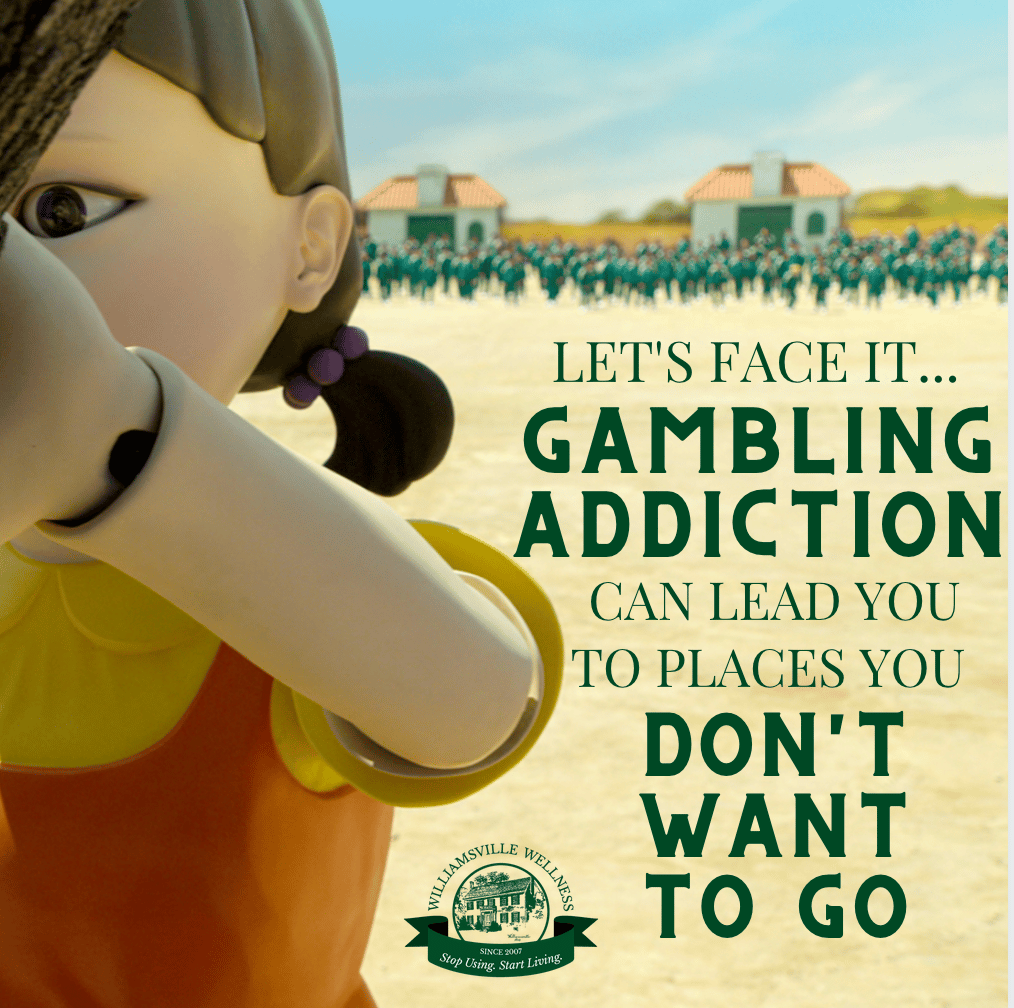Squid Game & Gambling Addiction

Squid Game is now Netflix’s most popular show ever by a large margin. It’s an entertaining watch with some thought-provoking concepts spanning an array of topics, one of which is gambling addiction.
We recommend you give it a watch if you haven’t already, but if not, be aware there are small spoilers in this post.
About Squid Game
The premise of the show is that hundreds of debt-stricken people find themselves with an opportunity to be free from those financial shackles once and for all.
The catch?
They have to play a series of children’s games, and if they don’t follow instructions they are promptly executed. For each person’s life, more money enters the jackpot. After the first game, people are obviously appalled and scared of what’s to come.
But one man remembers the rules they signed before coming that had a way out. This got the players back to the safety of their old lives.
But, this also meant coming back to lives that were just as bleak if not bleaker than what they had just escaped – because now they had an even smaller chance – if any – of ever being debt-free and also dealing with all of the hardships that come with that and having little to no money at any given moment.
Over 90% of the players found themselves choosing to go back to the games knowing full well what they were signing up for this time. All of them ready to compete for a chance to win the jackpot, at the cost of everyone around them.
The show’s protagonist, Seong Gi-hun, is like the other people that received the mysterious invitation; he is up to his neck in debt owing almost $3.5 million USD. But unlike the others, he finds himself in this predicament due to his gambling addiction that you can see firsthand running rampant in the pilot episode.
He goes as far as stealing his mother’s credit card to go off-track betting. And what does he do next? He has a public outburst while placing his bets after another bettor asked him to hurry up.
He didn’t stop there, though. Gi-hun then goes to seek more money from his ex-lover who is now happily with another man. A man whom Gi-hun’s daughter is far happier to see than her father. It all feels like a preview into what could have perhaps been his own life if he had taken a different path at some point along the way.
Gambling Addiction Themes in Squid Game
While the show is fiction, these threads weave a very real picture of gambling addiction for millions of people across the world.
Stealing, Child Neglect, and Other Crime
“He goes as far as stealing his mother’s credit card…”
- 80 to 90 percent of individuals who attend Gamblers Anonymous report engaging in illegal acts to get money for gambling.
- A study from Georgia State University found that 50% of problem gamblers commit crimes.
- A wide variety of crimes are committed as a result of gambling addiction; not just ‘white collar’ crimes such as theft and fraud, but also crimes that occur in public spaces such as street robbery. There is significant evidence of domestic abuse and child neglect linked to problem and pathological gambling (Breen et al, 2013; Cuadrado and Lieberman, 2011).
- A study of Gamblers Anonymous members found that 57 percent had stolen to finance their gambling with a combined financial impact of theft equaling $30 million.
- Compulsive gamblers are arrested seven times more frequently than non-gamblers.
Irritability
“He has a public outburst while placing his bets after another bettor asked him to hurry up.“
- There is a strong connection between mood disorders and gambling addiction. It is complex and the two can feed off one another, causing each to become more problematic.
- When one tries to stop gambling, irritability is common during the withdrawal period (because the body responds to gambling like substances, it withdrawals from gambling cessation just the same).
Broken Relationships
“All of them ready to compete for a chance at the jackpot, at the cost of everyone around them”
- The National Gambling Impact Study estimated the lifetime divorce rates for problem and pathological gamblers were 39.5% and 53.5% respectively; the same rate for non-gamblers was 18.2%.
- If a gambling addict with children finds themself in a divorce, the impacts of their addiction can make custody options dwindle.
Massive Debt
“3.5 million USD”
- As many as 23 million Americans go into debt because of gambling and according to the Wisconsin Council on Problem Gambling the average loss is estimated to be around $47,000.
- However, not everyone goes into debt. The issue behind chronic gambling is not a financial one, it’s due to a change in the brain. It’s an illness and a disorder.
Willing to Risk it All on the Small Chance You Can Make Up for Previous Bad Bets
“Over 90% of the players found themselves choosing to go back knowing full well what they were signing up for…”
When you’ve just lost this month’s mortgage payment, it may feel like the only way to get it back in time is to do the same thing that landed you here: gamble. So you take out a loan. Rinse and repeat and next thing you know you’re in the hole 6 figures deep, thinking it may not be so bad if it were feet underground instead. That’s Seong Gi-hun. That’s a potential two million people in this world today. That’s the reality of gambling addiction.
Problem Gambling Symptoms
- Gambling with increasing amounts of money
- Feeling restless or irritable when not gambling
- Being unable to stop or limit gambling
- Feeling preoccupied with gambling
- Gambling to escape stress or cope
- Returning to make up losses
- Lying about time and money spent gambling
- Depending on others for money due to losses
Get Help Today
If you identify with any of the symptoms or characteristics outlined above, click the button below to have a licensed professional screen you for problem gambling and treatment.
-Courtney Judd

